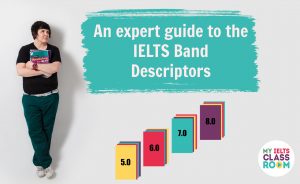
Improve your IELTS Coherence and Cohesion score
One of the great things about working at My IELTS Classroom is that it gives me the chance to collaborate with a range of great highly-qualified teachers. Juliet has been working with us for over 3 years now and, as a teacher who specialises in Cambridge exams that are not IELTS, she always brings a fresh approach to her teaching. One particular point that Juliet has been focussing on recently in marking is encouraging students to move away from using “people” repeatedly in their essays. This is not something that I had considered before, but once she had pointed it out, I realised that doing this can make a massive difference to a student’s IELTS coherence and cohesion score.
So, today, join Nick and I as we go through three different ways that you can remove “people” from your sentences to make them more concise and academic.
Below, you can find a summary of the episode, which includes all of the links to useful materials and the times of each part of the discussion (so you can go directly to the part you want to listen to) 🚀
Subscribe to My IELTS Classroom podcast on Apple podcasts here
Subscribe to My IELTS Classroom on Google podcasts here
Ways to remove “people” from your writing
Introduction – England lost the Euro 2020 football final (so Nick and I are sad!) 🏴
1. Use referencing
The most obvious way to remove “people” from a sentence is to use referencing. This means replacing the word “people” when it appears for a second or third time in a sentence with “they” (subject) or “them” (object).
- it is much easier for people to interact with each other if people work in an open-plan office.
- it is much easier for people to interact with each other if they work in an open-plan office.
However, this is not really the type of “people removing” that I want to focus on today. Any student who wants a 6.0 or higher for IELTS Coherence and Cohesion should be using simple referencing anyway. I am more interested in what we can do to remove the FIRST mention of “people” in this sentence!
Watch my free lesson about Referencing for a Band 7.0+
2. Replace “people” with a more specific noun
Let’s look at that sentence again.
- it is much easier for people to interact with each other if they work in an open-plan office.
A word like “people” literally means “anybody”, but in this sentence I think that we are focussing on a particular group of people: people who work in an office. Can you think of a specific word or words that you can use to describe these people? I can think of three:
- workers
- colleagues
- employees
Using ANY of these in the sentence would not only make it more specific, but it would also raise your score for Lexical Resource as it would be using more topic-specific vocabulary.
- it is much easier for workers / colleagues / employees to interact with each other if they work in an open-plan office.
Once you start thinking about using specific nouns to describe “people” in your essay, you will discover that there are many of these words. Here is a table with a few that I have thought of, but please add more in the comments if you can think of them!
| People | Words to replace "people" |
|---|---|
| people (who travel) | holidaymakers / tourists / travellers / backpackers |
| people (who drive a car) | drivers |
| people (who own a house) | house owners |
| people (who do a sport) | athletes / sportsmen / sportswomen |
| people (who buy from shops) | shoppers / consumers / customers |
| people (who visit restaurants) | diners / customers / restaurant-goers |
| people (who stay in a hotel) | guests |
| people (who study) | students / pupils / schoolchildren / graduates |
| people (who read books) | readers |
| people (who watch TV) | viewers / the audience |
| people (who live in a city) | urban residents / city-dwellers |
| people (who work together) | employees / workers / office staff |
| people (who live in a country) | citizens |
| people (who live in a foreign country) | locals |
Warning: Not all instances of “people” can be replaced
I just want to be clear at this point that not all instances of “people” can be replaced by a specific noun. This is very important! I don’t want you suddenly inventing phrases that do no exist in English. All we are looking for are words that are commonly used to described groups of people. Have a look at the following four sentences. In which one can “people” NOT be replaced? (you will find the answer in the podcast!)
- laws can make people more aware of the quality of the products that they buy
- for some people, making changes can be difficult, especially if they like having a routine
- when people visit a country, they should be mindful of the local traditions
- the government should run campaigns to raise people’s awareness about obesity
Discover the secret to writing a Band 7.0+ essay
Then download a copy of our FREE e-book, which explains the most common errors made by test-takers and how you can avoid them. Just click here for your copy.

3. Check if you need to use “people” at all in a sentence
Very often, students add “people” to a sentence even though it is not needed. Usually this is when it is totally obvious that it is people who are undertaking the action (and not dogs or aliens or trees, for example!) Look at these sentences. We can remove “people” and the meaning of the sentence remains clear.
- the government should run campaigns to raise
people’sawareness about obesity - taking out a credit card can result in financial trouble
for many people
In fact, I would argue that these sentences are vastly improved by removing “people” as they are now more concise and to the point!
Be careful – there are some verbs that always require an object!
English has very strict rules about verb patterns. There are some verbs that are always followed by an object, so with those verbs you will need to keep “people” even if it is obvious that you are talking about humans! Verbs like this are:
- allow – Having a holiday allows people to relax.
- cause – Not being able to find a job can cause some people to feel depressed.
- enable – A degree can enable people to get a well-paid job.
- encourage – Companies can encourage people to exercise in their lunch hour.
- force – Having rules will force people to start taking recycling more seriously.
- persuade – It can be hard to persuade people to change their behaviour.
- warn – Governments should warn people of the danger of eating fast food.
4. See if you can re-write the sentence to remove “people”
In the two sentences above, we could simple remove “people” directly from the sentence. However, in many cases it is not quite as simple as crossing “people” out. Very often, we will need to change the structure of our sentence so that it is grammatically correct with “people”.
There is no simple answer as to how you will do this, but the main three ways are to change the sentence from active to passive, to start your sentence with a gerund, or to start your sentence with a noun phrase. Look at the following three sentences and see if you can remove “people” using one of these methods (again, answers in the podcast!):
- I would argue that if people arrange everything in order, then homes are more relaxing places.
- However, people throw away too many products instead of recycling them
- Moreover, people’s wish to keep up with new fashion trends can lead them to spending money that they do not have
I hope that you can see from this lesson that getting a high IELTS coherence and cohesion score is much more than just sticking some transition signals between sentences! Good writing is skill that takes time (and good guidance) to master. If you are looking for a school with the expertise to take your IELTS score to the next level, then take a look at courses we offer at www.myieltsclassroom.com

